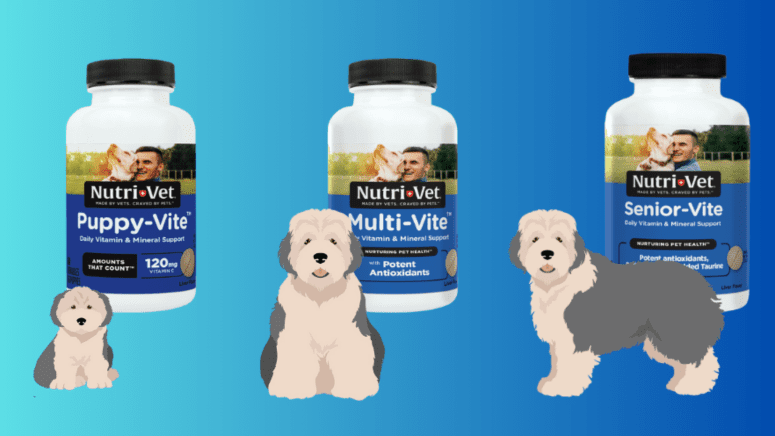Does my Dog Need Vitamins? Dog Vitamins Deep Dive
- review by Licensed Veterinary Technician, Wed. February 14, 2024
Vitamins and minerals play a crucial role in maintaining the health and well-being of our canine companions. Just like humans, dogs require a balanced intake of nutrients for optimal health. However, the nutritional and supplemental needs of dogs can vary significantly depending on their life stage, activity level, and overall health.
This blog explores the world of dog vitamins, highlighting why they are beneficial and how they can support your dog from puppyhood through to their senior years.

Which are the Best Vitamins for Dogs?
The best vitamins for dogs are those that complement their dietary needs, ensuring they get a balanced intake of essential nutrients. Key vitamins include:
- Vitamin A for vision and immune function
- Vitamin D for bone health
- Vitamin E for its antioxidant properties
- Vitamin K for blood clotting
Minerals like Zinc, Magnesium, and Copper are also vital for various physiological functions, from skin health to enzyme function.

Should You Give Your Dog Vitamins?
Supplementing your dog's diet with vitamins should be based on their specific needs, diet, and advice from your veterinarian. While some dogs may benefit greatly from added vitamins, especially if they have specific deficiencies or health conditions, others may get sufficient nutrients from a well-balanced diet.
It's essential to avoid over-supplementation, which can lead to toxicity, particularly with fat-soluble vitamins like A and D.
Can Dogs Have Chewable Vitamins?
If your vet deems supplementation necessary for your dog, you’ll have different options like chewable vitamins for dogs. Chewables for dogs are a popular and convenient way to ensure your dog gets the nutrients they need. They are often flavored to appeal to dogs, making them an easy addition to a dog's daily routine.
However, it's important to choose high-quality chewable tablets designed specifically for dogs and to follow the recommended dosage. Other vitamin forms include soft chews and liquids.

Dog Vitamins by Life Stage
-
Vitamins for All Life Stages
Certain vitamins are essential throughout a dog's life, supporting everything from bone health to immune function. A balanced diet, possibly supplemented with vitamins like Vitamin A, Vitamin D, Vitamin E, and the B-complex vitamins, can help maintain health and vitality at every stage. - Vitamins for Puppies
Did you know that puppies can benefit from different vitamins than adults? Let's review some essential vitamins and minerals for puppies, including:
- Vitamin A: Crucial for proper vision development and immune function.
- Vitamin D: Important for bone and muscle development.
- Vitamin E: Acts as an antioxidant, protecting body tissues.
- B-Complex Vitamins: Essential for energy metabolism and nervous system health
Ensuring that puppies receive these vitamins, either through their diet or supplements, is key to laying the foundation for a healthy life.
• Vitamins for Adult Dogs
As dogs mature, their nutritional needs shift. Adult dogs benefit from a well-rounded intake of:
- Vitamin A for Dogs: Supports vision and immune health.
- Choline: Vital for brain and liver health.
- Vitamins C and E for Dogs: Serve as important antioxidants.
- Vitamin D for Dogs: Essential for bone health and calcium regulation.
- Vitamin K for Dogs: Important for blood clotting.
- Zinc, Magnesium, Manganese, and Copper: Trace minerals that support numerous bodily functions.
- Thiamine, Riboflavin, Niacin, Vitamin B6, and Vitamin B12: Support energy production and cognitive function.
These nutrients help maintain energy levels, support organ function, and contribute to a healthy coat and skin.
• Vitamins for Senior Dogs
Senior dogs often face a decline in organ function and may be more prone to chronic conditions such as arthritis. Key vitamins and supplements for seniors include:
- Vitamin A for Dogs, Vitamin C, and Vitamin E: Antioxidant support is crucial for combating oxidative stress in aging cells.
- Choline: Supports brain health and can aid in managing age-related cognitive decline.
- Vitamin D and Vitamin K for Dogs: Continue to support bone and heart health.
- Joint Supplements for Dogs: Supplements like glucosamine and chondroitin can support joint health and mobility.
- B-Complex Vitamins: Remain essential for energy metabolism and neurological health.
Ensuring senior dogs have access to these vital nutrients can significantly impact their quality of life in their golden years.

Dog Vitamins FAQs
-
How is the nutritional information of dog vitamins presented?
It's important to understand that some products may list nutritional information based on large quantities, such as one kilogram, which can be misleading. Always check if the nutritional values are provided per serving or a different quantity to ensure proper dosage.
-
Are all dog vitamin chews suitable for small or large breeds?
Not all vitamin chews are suitable for small breeds. Some chews may be too hard for smaller dogs to consume, making them inappropriate for dogs under a certain size or with dental issues. It's essential to choose products that are specifically designed for your dog's size and dietary needs.
-
Can dog vitamins cause adverse reactions in dogs?
Yes, like any supplement or food product, dog vitamins can cause adverse reactions in some dogs, such as digestive upset or allergies. It's crucial to introduce any new supplement slowly and monitor your dog's reaction. Discontinue use and talk to your veterinarian immediately if any negative symptoms occur.
Dog vitamins and supplements can play a critical role in supporting the health and wellness of our canine friends. Understanding the specific needs of your dog at each life stage and consulting with a veterinarian can help you make informed decisions about supplementing their diet. Whether it's through high-quality commercial foods, specific supplements, or a combination of both, ensuring your dog receives the right balance of nutrients is key to a long, healthy, and happy life.

